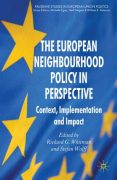In implementing the European Neighbourhood Policy (ENP) the European Union offers a deeper political and economic relationship to its neighbours, but without a promise of EU membership. The ENP is intended to be a strategic approach to the post-enlargement situation which redraws boundaries between the EU “insiders” and the “outsiders” on the EU’s borders.
Co-edited with Richard G. Whitman, this volume presents an empirical exploration of the ENP, in which the main emphasis is on an assessment of the impact the ENP has had so far and the factors that have shaped its implementation since 2003. The volume also provides a perspective on how to study this relatively new policy area. It contends that the ENP represents a distinctive challenge for scholars studying the European Union and that the development of a structured relationship that embraces neighbouring states represents a “coming of age” for the Union.
This book is a timely and welcome contribution to the emerging body of scholarship concerning European Union external relations. The volume offers an insightful and critical perspective on the nature and challenges of the European neighbourhood policy (ENP) in the region. It provides rich methodological, conceptual and empirical explorations of the policy, debating its rationale, validity and appropriateness for such a diverse environment as the EU’s neighbourhood, both in the south and the east. Elena A. Korosteleva-Polglase, Journal of Common Market Studies
This collection provides the reader with an extensive overview of the ENP and its weaknesses. Karen Smith, West European Politics
This collection provides an excellent overview of the ENP’s main features and challenges. Toby Vogel, European Voice

